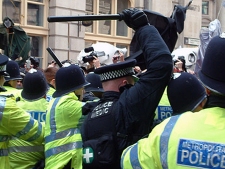This time they’ve killed one of their own: an innocent Square Mile worker on his way home. The police policy of squeeze-then-crush has led directly to the death of a man who wasn’t even protesting, let alone a violent or vandalistic thug.
The system will protect the politicians. That’s what it is there for. But we, the people, will not forget Mr. Tomlinson, nor will we forget whose arrogance killed him.
There are days when I hate being right.
The Guardian have produced footage demonstrating that Ian Tomlinson was batoned from behind by a police officer before dying on Wednesday night. He may or may not have been directly killed by the assault: that’s how the authorities can create some wriggle room to defend themselves. But even if they claim his death was not caused by being hassled and assaulted by paramilitary units on his way home from work, then surely it is inescapably obvious that it was caused by the tactics, policies, paranoia and (ultimately) arrogance of our political masters?
My sympathies are with the family and friends who have just seen evidence that their loved one was killed by the British state. My rage is aimed at, not the trooper on the street, but the men who hired him and in particular whoever was in a monitor-filled control room with a radio and who gave the order to use violence against a legitimate protest. And my question is this:
Will the British people have the courage to set aside partisan bickering and stand together, with one voice, to call the Establishment to account for the death of an innocent man?




